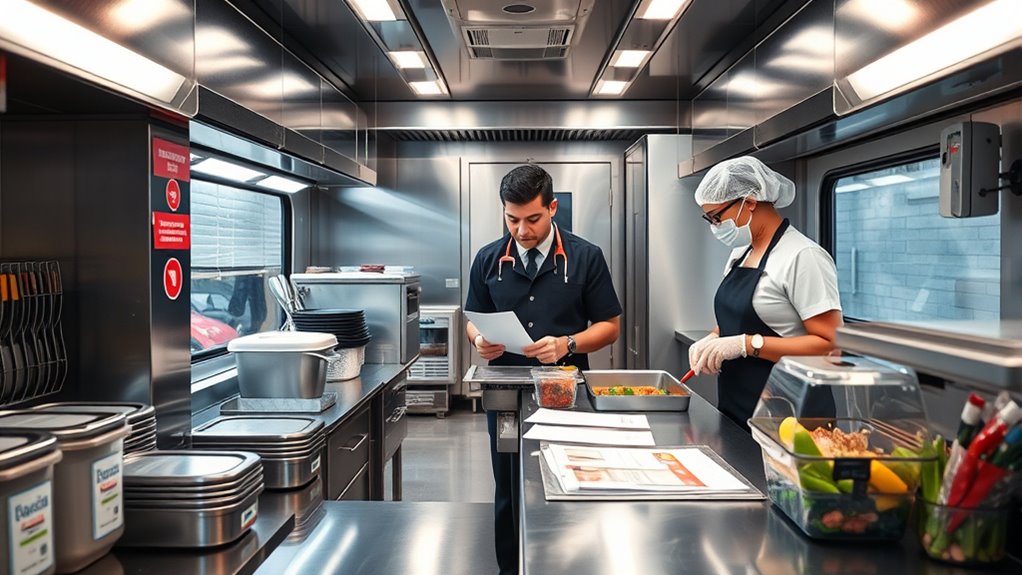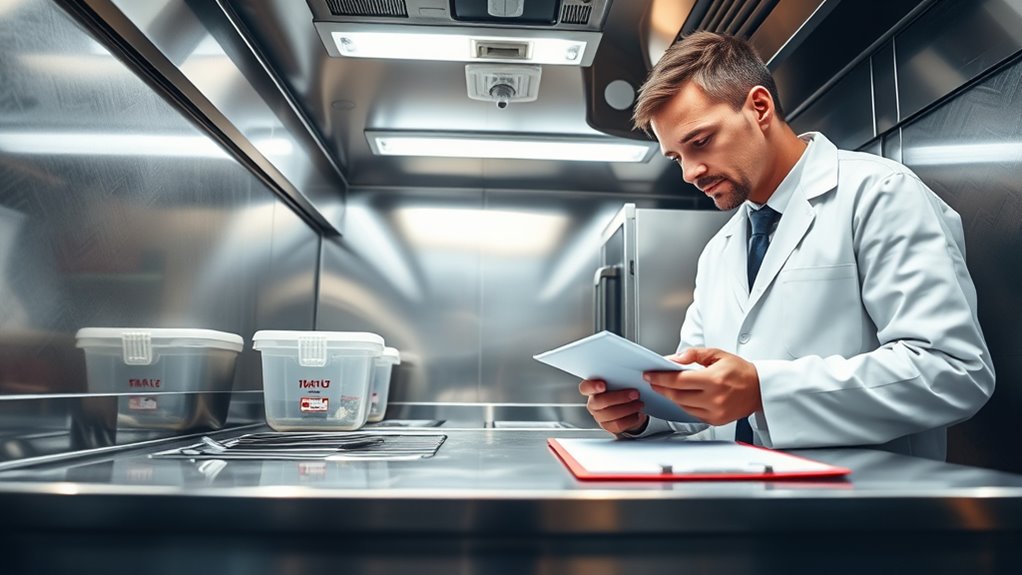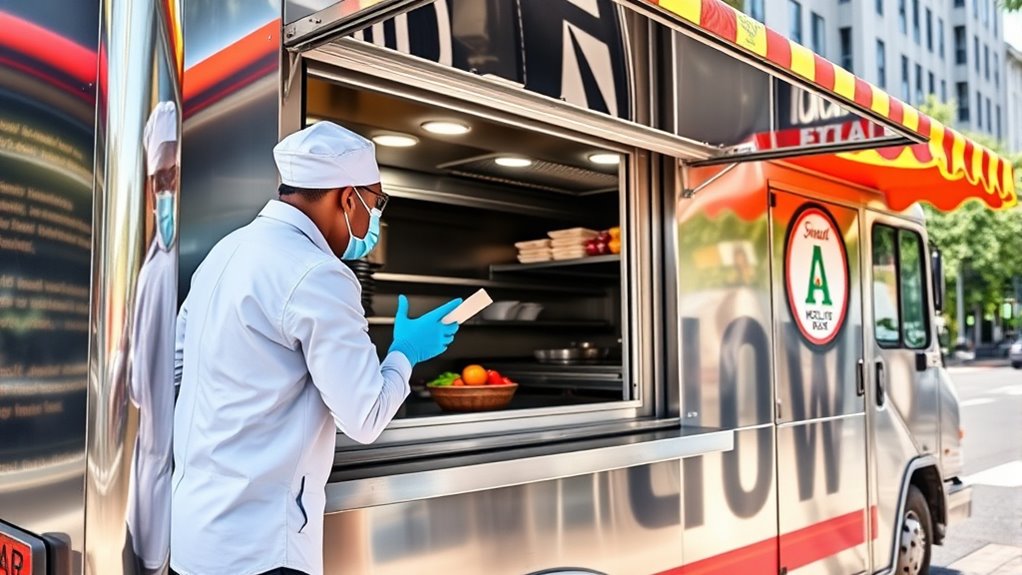To comply with health inspections for mobile food units, you need to understand local regulations, follow proper food handling and storage practices, keep your unit spotless, and make certain your staff are well-trained. Organize all documentation, regularly review updates on standards, and maintain thorough records. Preparing in advance and staying informed help you pass inspections confidently. Keep going to uncover more tips for maintaining compliance and keeping your operation running smoothly.
Key Takeaways
- Maintain a clean, organized workspace and ensure all equipment is sanitized and functional before inspections.
- Keep accurate records of food sourcing, storage, cleaning schedules, and employee training for easy review.
- Familiarize with local health regulations, permitted items, and inspection procedures to ensure compliance.
- Train staff regularly on hygiene standards, proper food handling, and inspection protocols to minimize violations.
- Prepare necessary documentation like permits, licenses, and health certificates, and keep them accessible during inspections.
Understanding Local Health Regulations and Requirements

Before operating a mobile food unit, you need to familiarize yourself with your local health regulations and requirements. These rules guide everything from food prep to menu planning, ensuring you meet safety standards. Start by reviewing specific guidelines for food handling, sanitation, and equipment. Proper menu planning helps prevent cross-contamination and keeps food at safe temperatures. Knowing local regulations also means understanding licensing, permitted food items, and inspection procedures. Staying current with any updates or changes is essential, as regulations can vary by city or state. Additionally, understanding home essentials related to sanitation and food safety can further support compliance efforts. By thoroughly understanding these requirements, you ensure your mobile food unit operates legally and safely. This knowledge forms the foundation for successful health inspections and a trustworthy reputation with customers.
Maintaining Proper Food Handling and Storage Practices

You need to make certain your food is stored correctly to prevent contamination and spoilage. Proper storage techniques and maintaining good hygiene are essential for safe handling. By following these practices, you’ll meet health standards and keep your customers safe. Additionally, implementing proper vehicle tuning can ensure your mobile food unit operates efficiently, reducing the risk of mechanical issues that could compromise food safety.
Proper Storage Techniques
Proper storage techniques are essential for maintaining food safety and preventing contamination in mobile food units. You must use appropriate storage containers to keep foods separate and protected. Ensuring proper temperature control is critical—cold foods should stay below 41°F, and hot foods above 135°F. Use thermometers regularly to monitor temperatures. Organize your storage so raw meats are stored below ready-to-eat items to prevent cross-contamination. Keep perishable items refrigerated or in insulated coolers. Proper labeling helps identify contents and storage times. Here’s a quick guide:
| Food Type | Storage Requirement |
|---|---|
| Raw meats | Store below ready-to-eat foods |
| Dairy | Keep at or below 41°F |
| Fruits & Veggies | Store in clean, covered containers |
| Cooked foods | Maintain above 135°F or refrigerated |
| Beverages | Store at room temperature or chilled |
Maintaining proper food handling practices ensures compliance with health inspections and keeps customers safe.
Hygiene and Sanitation
Maintaining good hygiene and sanitation practices is essential for keeping food safe in mobile food units. Proper handwashing, clean surfaces, and regular equipment sanitizing prevent contamination and ensure food safety. Your food truck branding should reflect a commitment to cleanliness, reassuring customers about your hygiene standards. When customers see clean, well-maintained spaces, it boosts engagement and builds trust. Store ingredients at correct temperatures, use separate utensils for raw and cooked foods, and avoid cross-contamination. Regularly sanitize all contact surfaces and keep trash away from food prep areas. Consistent hygiene practices not only meet health inspection requirements but also enhance your reputation. Prioritizing sanitation shows your dedication to customer safety and helps maintain a positive, professional image that encourages repeat business. Emphasizing hygiene and sanitation can foster a strong sense of trust and loyalty among your customers.
Ensuring Cleanliness and Sanitation of Your Mobile Unit

To guarantee your mobile food unit remains safe for customers, regular cleaning and sanitation are essential. Consistent practices prevent contamination and uphold health standards. Focus on thorough cleaning of surfaces, utensils, and equipment after each shift. Use proper sanitizers and ensure they’re at the right concentration. Keeping your mobile unit spotless also supports mobile unit branding, making a positive impression. Encourage customer feedback to identify areas needing improvement. Remember, a clean unit reassures customers and boosts your reputation. Incorporating a rustic farmhouse aesthetic in your unit’s presentation can enhance customer experience and create a welcoming atmosphere.
Preparing for the Inspection Process

Before your health inspection, make sure your equipment and supplies are in top shape and ready for review. Organize all your documents clearly to show compliance and readiness. Also, confirm your staff is well-trained so everyone knows how to maintain standards during the inspection.
Inspect Equipment and Supplies
When preparing for a health inspection, you need to thoroughly check that all equipment and supplies are clean, in good working order, and properly stored. Regular equipment maintenance guarantees everything functions correctly and meets safety standards. Keep your supply inventory organized to quickly locate items and verify stock levels. Use the table below to evaluate critical areas:
| Equipment Condition | Storage Practices | Supply Inventory Check |
|---|---|---|
| Ensure cleanliness and proper functioning | Store supplies off the ground and covered | Confirm stock matches inventory records |
| Conduct routine maintenance | Label storage areas clearly | Remove expired or damaged items |
| Address repairs promptly | Keep supplies organized for easy access | Track usage to prevent shortages |
Staying proactive helps you pass inspections smoothly and maintain safe food handling practices. Additionally, understanding the importance of AI and automation in optimizing operations can help streamline your processes and ensure compliance.
Organize Documents Properly
Having organized your equipment and supplies, the next step is to guarantee all necessary documents are in order. Proper document organization is essential for a smooth inspection process. Use mobile storage solutions to keep permits, licenses, and health certificates easily accessible. Arrange your documents in a designated folder or binder, clearly labeled for quick retrieval. Ensure all records are up to date and reflect current compliance standards. Keep a backup set of digital copies on a tablet or device, stored securely in your mobile storage. Regularly review and update your documents to avoid last-minute scrambles. Familiarity with grocery store hours can also help you plan your shopping and inspection schedule more effectively. Efficient document organization not only demonstrates professionalism but also helps you respond promptly to inspector requests, ensuring the inspection goes smoothly and confirming your commitment to health compliance.
Conduct Staff Training
Effective staff training is essential to guarantee everyone understands their roles and responsibilities during an inspection. You should focus on clear employee communication to ensure all team members know inspection protocols, safety standards, and sanitation procedures. Training must include reviewing the menu design to highlight stored ingredients and food prep areas, reducing contamination risks. Conduct mock inspections to identify gaps in knowledge and practice proper documentation handling. Emphasize the importance of maintaining a clean, organized workspace and responding confidently to inspector questions. Regularly update your staff on health code changes and reinforce best practices. Well-trained employees minimize mistakes and demonstrate your commitment to compliance, making the inspection process smoother and less stressful for everyone involved. Incorporating proper sanitation procedures into your training ensures ongoing compliance and safety.
Training Staff on Food Safety Protocols

How can mobile food unit staff guarantee they consistently follow food safety protocols? The key is thorough, ongoing training. Regular sessions ensure everyone understands procedures, reducing risks and building customer trust. Use customer feedback and marketing strategies to identify areas for improvement and emphasize the importance of safety. Additionally, understanding food safety standards is essential for maintaining compliance and ensuring customer health.
Keeping Accurate Documentation and Records

Maintaining accurate documentation and records is essential for ensuring food safety and complying with health regulations. Proper records help you track inventory, monitor food temperatures, and document cleaning schedules. This also supports effective menu planning, ensuring you meet safety standards while offering appealing options. Additionally, detailed records assist in refining marketing strategies by highlighting popular items and customer preferences. For example, keeping detailed logs of equipment maintenance related to your flat iron bike can prevent breakdowns and ensure safety standards are met.
To stay compliant, focus on:
- Keeping detailed logs of food sourcing and storage.
- Recording cleaning and sanitation activities diligently.
- Tracking employee training and health certifications.
- Documenting sales and menu changes for customer insights.
Accurate records not only satisfy inspectors but also improve operational efficiency, customer safety, and your overall business success.
Staying Updated on Changing Regulations

Keeping accurate records helps you stay compliant with current health standards, but regulations can change frequently. To keep up with mobile food safety requirements, regularly review updates from local health departments and industry resources. Subscribing to newsletters or alerts guarantees you’re aware of new rules or adjustments to existing regulations. Use an inspection checklist tailored to mobile food units to verify compliance during routine checks and stay prepared for inspections. Staying informed helps you adapt quickly, reducing violations and penalties. Attend workshops or training sessions offered by health agencies to deepen your understanding of evolving standards. Being aware of regulatory changes ensures your operation remains compliant and prevents unexpected violations. By proactively tracking changes, you ensure your mobile food unit meets all current regulations, maintaining a safe and compliant operation for your customers.
Frequently Asked Questions
How Often Do Health Inspections Typically Occur for Mobile Food Units?
You might wonder about the inspection frequency for mobile food units. Typically, health inspections are scheduled based on local regulations, often occurring once or twice a year. Inspection scheduling depends on your area’s health department policies, which aim to guarantee safety standards are met. It’s important to stay informed about your local requirements and maintain good practices so your mobile food unit passes inspections smoothly and consistently.
What Are Common Violations That Lead to Inspection Failures?
Imagine your mobile food unit as a spaceship needing to pass a starship inspection. Common violations include failing food safety standards like improper food storage, inadequate handwashing stations, or unclean surfaces. An inspection checklist helps identify these issues, ensuring compliance. If these violations occur, your unit risks failing the inspection, which could delay your operation. Regularly review food safety practices and maintain cleanliness to stay ahead of potential infractions.
Can I Appeal a Health Inspection Decision or Citation?
If you’re wondering about appealing a health inspection decision or citation, you can usually do so through an appeal process outlined by your local health department. Review the inspection guidelines to understand the reasons behind the citation, then submit a formal appeal within the specified timeframe. You’ll need to provide evidence or explanations to support your case. Following this process carefully can help you address issues and potentially have citations overturned.
What Equipment Is Required to Pass a Health Inspection?
When preparing for a health inspection, you need specific equipment to guarantee you pass. Focus on maintaining proper kitchen sanitation by keeping surfaces clean and sanitized. Make sure your equipment is well-maintained, functioning correctly, and free of contamination risks. This includes refrigeration units, cooking appliances, and handwashing stations. Properly cleaned and maintained equipment helps demonstrate your commitment to health standards, making it easier to meet inspection requirements and avoid citations.
Are There Specific Permits Needed for Different Types of Mobile Food Units?
You need to get specific permits based on your mobile food unit’s vehicle type, like permits by vehicle type, to operate legally. If you plan to serve specialty foods or unique menu items, you might also require specialty food licenses. Ensuring you have the right permits and licenses for your vehicle and menu helps you stay compliant with local regulations and avoid penalties, so check with your local health department before starting your operation.
Conclusion
Staying compliant with health inspections might seem challenging, but with proper knowledge and preparation, you’ll navigate it smoothly. Keep up-to-date on regulations, train your staff, and maintain cleanliness consistently. Remember, a well-prepared mobile food unit not only passes inspections but also builds customer trust. Isn’t providing safe, delicious food worth the extra effort? Stay proactive, stay compliant, and watch your mobile food business thrive!









